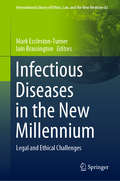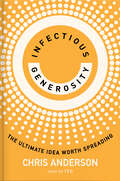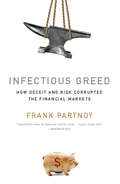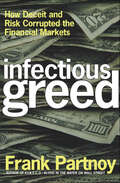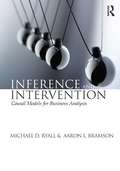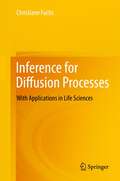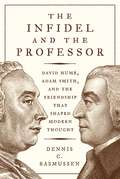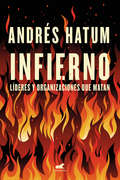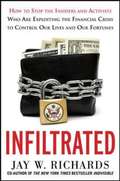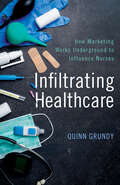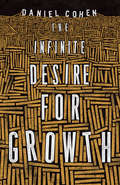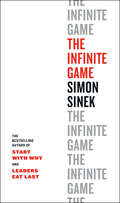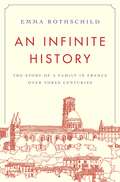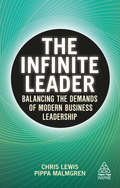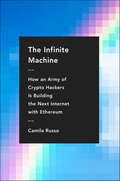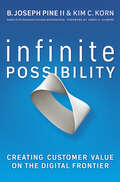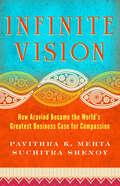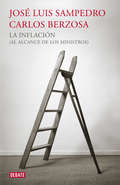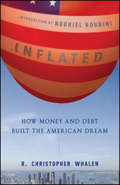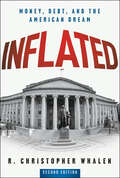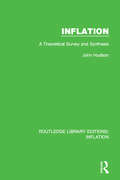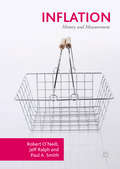- Table View
- List View
Infectious Diseases in the New Millennium: Legal and Ethical Challenges (International Library of Ethics, Law, and the New Medicine #82)
by Mark Eccleston-Turner Iain BrassingtonThis book examines the often tough questions raised by infectious diseases through essays that explore a host of legal and ethical issues. The authors also offer potential solutions in order to ensure that past errors are not repeated in response to future outbreaks. The essays touch on a number of key themes, including institutional competence, the accountability and responsibility of non-state actors, the importance of pharmaceuticals, and the move towards a rights-based approach in global health.Readers gain insights into such important questions as follows: How can we help victims in other countries? What (if any) responsibility should be placed upon international organizations whose actions exacerbate infectious diseases? How can we ensure that pharmaceutical research helps all communities, even those who cannot afford to pay for the products? While broadly covering global health law, the book adopts an inter-disciplinary approach that draws on public international law, philosophy, international relations, human rights law, and healthcare economics. As such, it is a valuable resource for academic libraries, appealing to scholars and postgraduates engaged in relevant research, as well as to those engaged with global health and policy at the international level.
Infectious Generosity: The Ultimate Idea Worth Spreading
by Chris AndersonThe bestselling author, media pioneer, and curator of TED explores one of humankind&’s defining but overlooked impulses, and how we can super-charge its potential to build a hopeful future—&“an essential read to kick off the new year&” (Forbes, &“16 Must Have Books and Podcasts for Leaders in 2024&”)&“I flew through these pages with an increasing sense of joy. I hope that millions read this book.&”—Elizabeth Gilbert, author of Eat, Pray, LoveLet&’s face it: Recent years have been tough on optimists. Hopes that the Internet might bring people together have been crushed by the ills of social media. Is there a way back?As head of TED, Chris Anderson has had a ringside view of the world&’s boldest thinkers sharing their most uplifting ideas. Inspired by them, he believes that it&’s within our grasp to turn outrage back into optimism. It all comes down to reimagining one of the most fundamental human virtues: generosity. What if generosity could become infectious generosity? Consider • how a London barber began offering haircuts to people experiencing homelessness—and catalyzed a movement• how two anonymous donors gave $10,000 each to two hundred strangers and discovered that most recipients wanted to &“pay it forward&” with their own generous acts• how TED itself transformed from a niche annual summit into a global beacon of ideas by giving away talks online, allowing millions access to free learningIn telling these inspiring stories, Anderson has given us &“the first page-turner ever written about human generosity&” (Elizabeth Dunn). More important, he offers a playbook for how to embark on our own generous acts—whether gifts of money, time, talent, connection, or kindness—and to prime them, thanks to the Internet, to have self-replicating, even world-changing, impact.
Infectious Greed: How Deceit and Risk Corrupted the Financial Markets
by Frank PartnoyAs the global financial crisis unfolds people everywhere are seeking to understand how markets devolved to this perilous, volatile state. In this dazzling and meticulously researched work of financial history, first published in 2003, and now thoroughly revised and updated, law professor and financial expert Frank Partnoy tells the story of how "classical" Wall Street securities like stocks and bonds were quietly eclipsed by ever more "quantum" products like derivatives. He documents how, starting in the mid-1980s, each new level of financial risk and complexity obscured the sickness of corporate America, and how Wall Street's evlving paradigm moved farther and farther beyond the understanding-and regulation-of ordinary investors and government overseers, leading inevitably to disaster.
Infectious Greed: How Deceit and Risk Corrupted the Financial Markets
by Frank PartnoyFrom the bestselling author of F.I.A.S.C.O., a riveting chronicle of the rise of dangerous financial instruments and the growing crisis in American businessOne by one, major corporations such as Enron, Global Crossing, and Worldcom imploded all around us, prey to a greed-driven culture and dubious or illegal corporate finance and accounting.In a compelling and disturbing narrative, Frank Partnoy's Infectious Greed brings to bear all of his skills and experience as a securities attorney, financial analyst, law professor, and bestselling author to tell the story of the rise of the trading instruments and corporate financial structures that imperil the economic health of the country. Starting in the mid-1980s with the introduction of the first proto-derivatives, and taking us through such high-profile disasters as Barings Bank and Long Term Capital Management, Partnoy traces a seamless progression to today's dangerous manipulations. He documents how each new level of financial risk and complexity obscured the sickness of the company in question, and required ever more ingenious deceptions. It's an alarming story, but Partnoy offers a clear vision of how we can step back from the precipice.
Inference and Intervention: Causal Models for Business Analysis
by Michael D. Ryall Aaron L. BramsonRyall and Bramson's Inference and Intervention is the first textbook on causal modeling with Bayesian networks for business applications. In a world of resource scarcity, a decision about which business elements to control or change – as the authors put it, a managerial intervention – must precede any decision on how to control or change them, and understanding causality is crucial to making effective interventions. The authors cover the full spectrum of causal modeling techniques useful for the managerial role, whether for intervention, situational assessment, strategic decision-making, or forecasting. From the basic concepts and nomenclature of causal modeling to decision tree analysis, qualitative methods, and quantitative modeling tools, this book offers a toolbox for MBA students and business professionals to make successful decisions in a managerial setting.
Inference for Diffusion Processes
by Christiane FuchsDiffusion processes are a promising instrument for realistically modelling the time-continuous evolution of phenomena not only in the natural sciences but also in finance and economics. Their mathematical theory, however, is challenging, and hence diffusion modelling is often carried out incorrectly, and the according statistical inference is considered almost exclusively by theoreticians. This book explains both topics in an illustrative way which also addresses practitioners. It provides a complete overview of the current state of research and presents important, novel insights. The theory is demonstrated using real data applications.
The Infidel and the Professor: David Hume, Adam Smith, and the Friendship That Shaped Modern Thought
by Dennis C. RasmussenThe story of the greatest of all philosophical friendships—and how it influenced modern thoughtDavid Hume is widely regarded as the most important philosopher ever to write in English, but during his lifetime he was attacked as “the Great Infidel” for his skeptical religious views and deemed unfit to teach the young. In contrast, Adam Smith was a revered professor of moral philosophy, and is now often hailed as the founding father of capitalism. Remarkably, the two were best friends for most of their adult lives, sharing what Dennis Rasmussen calls the greatest of all philosophical friendships. The Infidel and the Professor is the first book to tell the fascinating story of the friendship of these towering Enlightenment thinkers—and how it influenced their world-changing ideas.The book follows Hume and Smith’s relationship from their first meeting in 1749 until Hume’s death in 1776. It describes how they commented on each other’s writings, supported each other’s careers and literary ambitions, and advised each other on personal matters, most notably after Hume’s quarrel with Jean-Jacques Rousseau. Members of a vibrant intellectual scene in Enlightenment Scotland, Hume and Smith made many of the same friends (and enemies), joined the same clubs, and were interested in many of the same subjects well beyond philosophy and economics—from psychology and history to politics and Britain’s conflict with the American colonies. The book reveals that Smith’s private religious views were considerably closer to Hume’s public ones than is usually believed. It also shows that Hume contributed more to economics—and Smith contributed more to philosophy—than is generally recognized.Vividly written, The Infidel and the Professor is a compelling account of a great friendship that had great consequences for modern thought.
Infierno: Líderes y organizaciones que matan
by Andrés Hatum¿Cuándo aparecen estos líderes infernales en nuestras vidas? ¿Cómo determinan nuestra forma de pensar? ¿Por qué se hacen dueños de las organizaciones y logran liquidarlas y en el camino arruinar a las personas que allí trabajan?En este nuevo libro, Andrés Hatum nos muestra que este tipo de líderes siempre está latente en nuestra sociedad y en las empresas. «Desde hace años Andrés Hatum analiza el liderazgo dentro de las organizaciones facilitando el reconocimiento de personalidades tóxicas o positivas. Aquí retoma el lado oscuro del poder, desnudando a los líderes infernales y a los de tipo incompetente o idiotas. Señala sus características de modo original, zigzagueando por diversos períodos y líderes históricos. Y no solo apunta a la individualización de estas formas nocivas de autoridad, sino al uso de dicho conocimiento para -en palabras de Hatum- salvarnos de ellos, verdaderos monstruos que pueden estar esperando en cualquier oficina con una bella corbata.»Luciana Sabina, historiadora. Autora de Héroes y villanos «Infierno es un enorme libro que tiene una característica muy valorada: a cada paso encuentra centenares de historias pasadas que son disparadores de ejemplos presentes. Personalidades variadas aparecen para mostrarnos alguna conducta o forma que hoy naturalizamos. Ahora bien, esto está escrito por el gran Hatum y eso constituye un condimento especial. Imagino sus tonos, sus movimientos, su gracia, sus ejemplos presentados en vivo y hasta es posible pensarlo con un disfraz metido en el personaje que ayude a entender mejor.»Diego Cabot, periodista, prosecretario de Redacción de La Nación. Autor de Los cuadernos
Infiltrated: How to Stop the Insiders and Activists Who Are Exploiting the Financial Crisis to Control Our Lives and Our Fortunes
by Jay W. RichardsWhat Every American Needs to Know About the War on Free Enterprise--and Freedom Itself. America: be warned. A new wave of financial reformers has infiltrated our public institutions at both the state and national levels. A growing army of self-proclaimed activists, philanthropists, and politicians has infiltrated not only the Consumer Financial Protection Bureau, but the FDIC, the Treasury, and other regulatory agencies. This explosive new book from New York Times bestselling author Jay W.
Infiltrating Healthcare: How Marketing Works Underground to Influence Nurses
by Quinn GrundyHow sales representatives from Big Pharma and other healthcare companies circumvent public and regulatory scrutiny by forging relationships with nurses.Awarded second place in the 2019 AJN Book of the Year Award in the Professional Issues Category by the American Journal of NursingIt was once common for pharmaceutical companies and medical device makers to treat doctors to lavish vacations or give them new cars; companies would do virtually anything to buy influence so that their medications or devices would be used in a doctor’s office or hospital. But with growing public scrutiny of kickbacks to doctors, the huge giveaways have disappeared. In Infiltrating Healthcare, Quinn Grundy shows that sales representatives are working instead behind the scenes. It is to nurses that these companies now market. Nurses, Grundy argues, are the perfect target for sales reps: their work is largely invisible and frequently undervalued, yet they wield a great deal of influence over treatment and purchasing decisions. Furthermore, there are no legal restrictions on marketing to most nurses. Grundy describes how, under the guise of education or product support, and through gifts and free samples, sales representatives influence nurses in the course of day-to-day clinical practice. Grundy argues that the very presence of sales reps in operating rooms, purchasing committee meetings, and patient care units blurs the boundaries between patient care and medical sales. Helpfully, she also describes ways that nurses can be aware of (and resistant to) their influence. Infiltrating Healthcare is a call to action to protect the clinical spaces where we are at our most vulnerable—and the decisions that take place there—from the pursuit of profit at any cost. This is a timely book that shines a light on a practice that often goes unseen, and which has tangible implications for healthcare policy and practice.
The Infinite Desire for Growth
by Daniel Cohen Jane ToddWhy society’s expectation of economic growth is no longer realisticEconomic growth--and the hope of better things to come—is the religion of the modern world. Yet its prospects have become bleak, with crashes following booms in an endless cycle. In the United States, eighty percent of the population has seen no increase in purchasing power over the last thirty years and the situation is not much better elsewhere. The Infinite Desire for Growth spotlights the obsession with wanting more, and the global tensions that have arisen as a result. Amid finite resources, increasing populations, environmental degradation, and political unrest, the quest for new social and individual goals has never been so critical.Leading economist Daniel Cohen provides a whirlwind tour of the history of economic growth, from the early days of civilization to modern times, underscoring what is so unsettling today. The new digital economy is establishing a "zero-cost" production model, inexpensive software is taking over basic tasks, and years of exploiting the natural world have begun to backfire with deadly consequences. Working hard no longer guarantees social inclusion or income. Drawing on economics, anthropology, and psychology, and thinkers ranging from Rousseau to Keynes and Easterlin, Cohen examines how a future less dependent on material gain might be considered and, how, in a culture of competition, individual desires might be better attuned to the greater needs of society.At a time when wanting what we haven't got has become an obsession, The Infinite Desire for Growth explores the ways we might reinvent, for the twenty-first century, the old ideal of social progress.
The Infinite Game: How Great Businesses Achieve Long -lasting Success The
by Simon SinekFrom the New York Times bestselling author of Start With Why and Leaders Eat Last, a bold framework for leadership in today’s ever-changing world. How do we win a game that has no end? Finite games, like football or chess, have known players, fixed rules and a clear endpoint. The winners and losers are easily identified. Infinite games, games with no finish line, like business or politics, or life itself, have players who come and go. The rules of an infinite game are changeable while infinite games have no defined endpoint. There are no winners or losers—only ahead and behind. The question is, how do we play to succeed in the game we’re in? In this revelatory new book, Simon Sinek offers a framework for leading with an infinite mindset. On one hand, none of us can resist the fleeting thrills of a promotion earned or a tournament won, yet these rewards fade quickly. In pursuit of a Just Cause, we will commit to a vision of a future world so appealing that we will build it week after week, month after month, year after year. Although we do not know the exact form this world will take, working toward it gives our work and our life meaning. Leaders who embrace an infinite mindset build stronger, more innovative, more inspiring organizations. Ultimately, they are the ones who lead us into the future.
An Infinite History: The Story of a Family in France over Three Centuries
by Emma RothschildAn innovative history of deep social and economic changes in France, told through the story of a single extended family across five generationsMarie Aymard was an illiterate widow who lived in the provincial town of Angoulême in southwestern France, a place where seemingly nothing ever happened. Yet, in 1764, she made her fleeting mark on the historical record through two documents: a power of attorney in connection with the property of her late husband, a carpenter on the island of Grenada, and a prenuptial contract for her daughter, signed by eighty-three people in Angoulême. Who was Marie Aymard? Who were all these people? And why were they together on a dark afternoon in December 1764? Beginning with these questions, An Infinite History offers a panoramic look at an extended family over five generations. Through ninety-eight connected stories about inquisitive, sociable individuals, ending with Marie Aymard’s great-great granddaughter in 1906, Emma Rothschild unfurls an innovative modern history of social and family networks, emigration, immobility, the French Revolution, and the transformation of nineteenth-century economic life.Rothschild spins a vast narrative resembling a period novel, one that looks at a large, obscure family, of whom almost no private letters survive, whose members traveled to Syria, Mexico, and Tahiti, and whose destinies were profoundly unequal, from a seamstress living in poverty in Paris to her third cousin, the cardinal of Algiers. Rothschild not only draws on discoveries in local archives but also uses new technologies, including the visualization of social networks, large-scale searches, and groundbreaking methods of genealogical research.An Infinite History demonstrates how the ordinary lives of one family over three centuries can constitute a remarkable record of deep social and economic changes.
The Infinite Leader: Balancing the Demands of Modern Business Leadership (Kogan Page Inspire)
by Chris Lewis Dr Pippa MalmgrenBestselling and award-winning author duo Chris Lewis and Pippa Malmgren are calling it out. In The Infinite Leader, they argue that the spectacular leadership failures that we have witnessed in recent history, stretching across business, community life and politics, can be explained by a lack of balance. Having spent centuries perfecting processes and systems to maximize productivity and being indicted to the shrine of numbers, KPI's and financial forecasting, we have to admit, there are very few examples of sustainable and inspirational leadership figures out there. By over-relying on the hard stuff, we have disregarded whole dimensions of values that are desperately needed when trying to engage communities of people towards a common goal. The Infinite Leader is a roadmap to introducing balance back into organizations. You can adapt your stance to the infinite possibilities facing you as a leader, and balance the main quadrants of the rational, emotional, spiritual and physical leader, to deliver sustainable leadership with integrity. Business is still about people - people operate across paradoxes and opposing forces, in a world that confounds these influences. Leaders need to continuously juggle and neutralize these to succeed. Be what your people need you to be and learn what they don't teach you in business schools; remain analytical and numbers-focused when needed, but also bring your heart, person and integrity to leadership.
The Infinite Machine: How an Army of Crypto-Hackers Is Building the Next Internet with Ethereum
by Camila RussoWritten with the verve of such works as The Big Short, The History of the Future, and The Spider Network, here is the fascinating, true story of the rise of Ethereum, the second-biggest digital asset in the world, the growth of cryptocurrency, and the future of the internet as we know it.Everyone has heard of Bitcoin, but few know about the second largest cryptocurrency, Ethereum, which has been heralded as the "next internet."The story of Ethereum begins with Vitalik Buterin, a supremely gifted nineteen-year-old autodidact who saw the promise of blockchain when the technology was in its earliest stages. He convinced a crack group of coders to join him in his quest to make a super-charged, global computer.The Infinite Machine introduces Vitalik’s ingenious idea and unfolds Ethereum’s chaotic beginnings. It then explores the brilliant innovation and reckless greed the platform—an infinitely adaptable foundation for experimentation and new applications—has unleashed and the consequences that resulted as the frenzy surrounding it grew: increased regulatory scrutiny, incipient Wall Street interest, and the founding team’s effort to get the Ethereum platform to scale so it can eventually be accessible to the masses.Financial journalist and cryptocurrency expert Camila Russo details the wild and often hapless adventures of a team of hippy-anarchists, reluctantly led by an ambivalent visionary, and lays out how this new foundation for the internet will spur both transformation and fraud—turning some into millionaires and others into felons—and revolutionize our ideas about money.
Infinite Possibility: Creating Customer Value on the Digital Frontier
by B. Joseph Pine II Kim C. KornIn 1999 Joseph Pine and Jim Gilmore identified a seismic shift in the modern econ- omy. To set yourself apart from your competition, you needed to offer your customers more than just great goods or attentive service. You needed to offer experiences-- memorable events that engage people in inherently personal ways. We're now deep into this Experience Economy. But the physical world, bounded as it is by matter, space, and time, offers limited opportunities for creating experiences. Digital technology, on the other hand, offers limitless opportunities--you can create anything you want with immaterial bits, in virtual places, without the constraints of linear time. Which is precisely the problem. How do you make sense of and sort through such infinite possibility? What kinds of experiences can you create? Which ones should you offer? In Infinite Possibility, Pine and coauthor Kim Korn provide a profound new tool geared to the task of exploring what they call the cosmos incogniti of the digital frontier, the unknown worlds out there to be discovered, explored, and exploited. They delineate eight different realms of experience encompassing various aspects of Reality and Virtuality and, using scores of examples, show how innovative compa- nies operate within and across each realm to create extraordinary customer value. Think of the Xbox Kinect, which combines virtual video games with a powerful physical dimension--you play by moving your own body. Or new apps that, when you point your smartphone camera at a real street, lay digital information about the scene over the image. Follow Pine and Korn out onto the digital frontier to discover the opportunities that abound for your business.
Infinite Technology Solutions and the Delhi-Mumbai Industrial Corridor
by Vidhya Muthuram John D. MacomberThe Delhi-Mumbai Industrial Corridor (DMIC) is an ambitious economic development project linking six of the most competitive states in India with the sea. The corridor is modeled on the Jiangsu Corridor in China (Nanjing to Shanghai) and the Tokyo-Hokkaido Corridor in Japan. The Government of Japan is a major investor. Several of India's proposed Smart Cities are located on the Corridor. Eventual success of the corridor depends on attracting jobs in very large numbers. Infinite Technology is a big IT and BPO firm in Bangalore. The case looks at the economics and soft issues as Anjali Varma of Infinite decides whether to depart Bangalore for Dholera on the DMIC. This case is intended to be used with HBS Case 214-077, "Delhi-Mumbai Industrial Corridor: India's Road to Prosperity?"
Infinite Vision: How Aravind Became the World's Greatest Business Case for Compassion
by Pavithra K. Mehta Suchitra Shenoy&“A must-read for anyone interested in leadership, service, and the building of institutions that release the best energies of the human spirit.&” —Jacqueline Novogratz, New York Times-bestselling author When a crippling disease shattered his lifelong ambition, Dr. V (Venkataswamy) chose an impossible new dream: to cure the world of blindness. The tiny clinic he founded in India defied conventional business logic and is now the largest provider of eye care on the planet. At Aravind, patients choose whether to pay or not. Millions are treated for free, yet the organization remains stunningly self-reliant. Serving everyone from penniless farmers to the president, it delivers world-class outcomes at less than a hundredth of what similar services cost in advanced nations. Its model is emulated by organizations everywhere from Rwanda to San Francisco.Infinite Vision uncovers the radical principles behind Aravind&’s baffling success. Charged with profound insights and stories, it draws readers to the heart of Dr. V&’s selfless vision, proving how choices that seem quixotic can, when executed with compassion and integrity, yield incredible results—results that can light the eyes of millions.&“Reveals the power of a model that combines business discipline with compassion. May the wisdom of Dr. V and Aravind shared here inspire many such initiatives for the wellbeing of future generations.&” —Muhammad Yunus, Nobel Peace Prize Laureate, Founder, Grameen Bank&“Aravind may be a case study for MBA students, and a model social business, but to me this book told a story, with elegance, clarity and intimacy.&” —Fred de Sam Lazaro, PBS NewsHour&“In the world of blindness Dr. V has performed a miracle.&” —Ram Dass, author of Be Here Now
La inflación (al alcance de los ministros)
by Carlos Berzosa José Luis SampedroEn este libro, José Luis Sampedro y Carlos Berzosa procuran mostrar al ciudadano lo que la economía oficial prefiere ignorar o enmascarar. La inflación vuelve a ser la protagonista de nuestro día a día y se ha convertido una vez más en la excusa en la que se escudan las autoridades económicas y financieras para adoptar políticas restrictivas. En su ya clásico estudio, José Luis Sampedro, uno de los economistas más respetados de España, diseccionaba la inflación y la hacía comprensible para el gran público. En esta redición revisada, analiza por qué ha vuelto y a qué obedece la necesidad de airear la amenaza de la inflación.
La inflación (al alcance de los ministros)
by José Luis Sampedro Carlos BerzosaLa gran obra de Sampedro sobre la inflación, revisada y actualizada. En este libro sobre la inflación, José Luis Sampedro y Carlos Berzosa procuran mostrar al ciudadano lo que la ciencia económica oficial prefiere ignorar o enmascarar. La inflación, un fantasma que parecía controlado desde mediados de los noventa, vuelve a estar en boca de todos, ya que es la excusa en la que se escudan las autoridades económicas y financieras para adoptar políticas restrictivas que asfixian aún más las débiles señales de crecimiento. En su ya clásico estudio, José Luis Sampedro, uno de los economistas más respetados de España, diseccionaba la inflación y la hacía comprensible para el gran público. Además, frente a la ortodoxia de la teoría económica, exponía una visión mucho más crítica en la que la inflación era una herramienta fundamental del sistema. En el amplio epílogo de Carlos Berzosa que actualiza la obra se repasa la historia de la inflación desde que fue controlada en los noventa, y se analiza por qué ha vuelto y a qué intereses beneficia su retorno.
Inflated
by Nouriel Roubini R. Christopher WhalenAmericans as a whole view themselves as reasonably prudent and sober people when it comes to matters of money, reflecting the puritan roots of the earliest European settlers. Yet as a community, we also seem to believe that we are entitled to a lifestyle that is well-beyond our current income, a tendency that goes back to the earliest days of the United States and particularly to get rich quick experiences ranging from the Gold Rush of the 1840s to the real estate bubble of the early 21st Century.Inflated examines this apparent conflict and makes the argument that such a world view is so ingrained in us that to expect the United States to live in a "deflated" world is simply unrealistic. It skillfully seeks to tell the story of, money inflation and public debt as enduring (and perhaps endearing) features of American life, rather than something we can one day overcome as our policy makers constantly promise.Features interviews with today's top financial industry leaders and insiders.Offer a glimpse into the future of the Federal Reserve and the role it will play in the coming yearsExamines what the future may hold for the value of the U.S. dollar and the real incomes of future generations of AmericansThe gradual result of the situation we find ourselves in will inevitably lead to inflation, loss of economic opportunity, and a decline in the value of the dollar. This book will show you why, and reveal how we might be able to deal with it.
Inflated: Money, Debt, and the American Dream
by R. Christopher WhalenDiscover where America's monetary system is heading—and how it will impact you—in the years to come In the newly revised second edition of Inflated: How Money & Debt Built the American Dream, veteran investment banker, author, and Chairman of Whalen Global Advisors LLC delivers the latest installment of his concise history of the United States' monetary system, putting contemporary financial phenomena like inflation and high housing costs into context. You'll learn to understand how issues like the public debt and the rise of cryptocurrencies can be understood through the lens of how the United States government exploits debt and the monetary system to fund its operations. The author explains: How contemporary concepts like Modern Monetary Theory fit into and influence the American economy How and why the United States' debt has tripled in the last fifteen years and the necessary consequences of that increase The likelihood and potential impacts of another economic correction during the 2020s An engrossing and essential read for anyone interested in the economic and monetary realities driving our markets, politics, and societies, the second edition of Inflated is an eye-opening discussion of the drastic changes unfolding in the American economy and the even more dramatic transformations that lie just beyond the horizon.
Inflation: A Theoretical Survey and Synthesis (Routledge Library Editions: Inflation)
by John HudsonOriginally published in 1982, this book begins with a wide-ranging and critical review of both first and second generation theories of inflation (and the related problem of unemployment), including the classical approach to macroeconomics. The author systematically integrates search, implicit contract, expectations and wage-bargaining theeoriees to outline a new and original synthesis. This synthesis and switching regimes model is then rigorously examined to see how well it can explain inflation the US and the UK.
Inflation
by Robert O'Neill Jeff Ralph Paul A. SmithThis book is an introduction to the history of - and current measurement practice of - inflation for the United Kingdom. The authors describe the historical development of inflation measures in a global context, and do so without using formal mathematical language and related jargon that relates only to a few specialist scholars. Although inflation is a widely used and quoted statistic, and despite the important role inflation plays in real people's lives - through pension uprating, train tickets, interest rates and the work of economists - few people understand how it is created. O'Neill, Ralph and Smith mix historical data with a description of practices inside the UK statistical system and abroad, which will aid understanding of how this important economic statistic is produced, and the important and controversial choices that statisticians have made over time.
Inflation and Conflict in Iraq: The Economics of Shortages Revisited
by David A Grigorian Udo KockA report from the International Monetary Fund.
